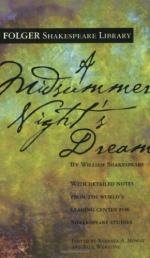|
This section contains 4,446 words (approx. 12 pages at 400 words per page) |

|
[In his discussion of A Midsummer Night's Dream, Bonnard's principal thesis is that the worlds, fantastic and mundane, represented in the play, exist apart from each other, never meeting at any given point The inhabitants of the fairy world, the critic explains, are indeed ethereal in the sense that they lack true feelings and intelligence. But the dream world, Bonnard argues, although beyond the mortals' comprehension, nevertheless strongly influences the entire realm of ordinary life. Although separated by a veritable social chasm, the Athenian aristocrats and the common players are all vulnerable to Oberon's power by the very nature of their humanity. Yet this fairy kingdom is essentially a dream which appears whenever reason goes to sleep. Such illusions and dreams, Bonnard remarks, can be dangerous if they block our perception of reality, but there they nevertheless perfonn an important function in life, as the playwright...
|
This section contains 4,446 words (approx. 12 pages at 400 words per page) |

|




